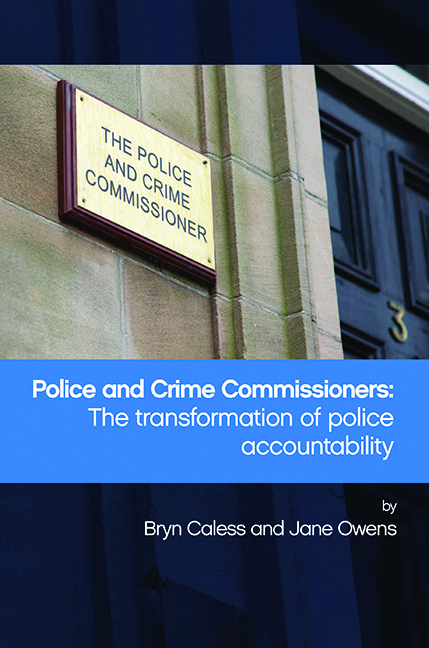Book contents
- Frontmatter
- Dedication
- Contents
- List of tables and figure
- Glossary of terms
- Acknowledgements
- Introduction
- one Governance: the Police and Crime Commissioner and police accountability in context
- two The psephology of the November 2012 election: motive, means and opportunity
- three Is the law on my side? Relationships between the PCC and the chief police officer team
- four Partners, colleagues or rivals for oversight? The (PCC) art of making friends and influencing people
- five “Putting yourself about”: PCCs, the media and the public
- six The debate with no end: PCCs’ remit and the problems of policing
- seven “I wonder if the game is worth the candle”: PCCs, their ‘work–life balance’ and their future
- General summary
- Bibliography
- Appendix Interview questionnaires
- Index
four - Partners, colleagues or rivals for oversight? The (PCC) art of making friends and influencing people
Published online by Cambridge University Press: 01 September 2022
- Frontmatter
- Dedication
- Contents
- List of tables and figure
- Glossary of terms
- Acknowledgements
- Introduction
- one Governance: the Police and Crime Commissioner and police accountability in context
- two The psephology of the November 2012 election: motive, means and opportunity
- three Is the law on my side? Relationships between the PCC and the chief police officer team
- four Partners, colleagues or rivals for oversight? The (PCC) art of making friends and influencing people
- five “Putting yourself about”: PCCs, the media and the public
- six The debate with no end: PCCs’ remit and the problems of policing
- seven “I wonder if the game is worth the candle”: PCCs, their ‘work–life balance’ and their future
- General summary
- Bibliography
- Appendix Interview questionnaires
- Index
Summary
Emerging from the transformed local policing landscape are new ways of working, negotiating, and of ‘getting the job done’. We have already examined the relationships that PCCs have with their chief police officer team; in this chapter we explore the corollary of how PCCs work with and alongside significant key partners who impact either nationally or locally on their role: the Home Office, Her Majesty's Inspector of Constabulary (HMIC), and local partnerships like the Community Safety Partnerships (CSPs). We focus on the nature of those relationships and what PCCs want from them (and indeed what others want from the PCCs). It is occasionally a landscape of opposition and hostility, sometimes an area of cooperative enterprise and mostly a place in which PCCs are feeling their way carefully as they secure their places in the local hierarchy of emergency service and criminal justice.
In 2008, a review of policing chaired by Sir Ronnie Flanagan (then HM Chief Inspector of Constabulary) proved influential with Whitehall and police alike in bringing about changes to the nature of governance that has since dominated contemporary policing. A White Paper (Home Office, 2010) proposed that the responsibility for local policing was ‘moved out of Whitehall’ and returned ‘to Chief Constables, their staff and the communities they serve’ (Home Office, 2010, p. 2). It was not quite as simple a process as this bland statement suggests. As we noted in Chapter One, the Police Reform and Social Responsibility Act 2011 tried to establish a new ‘quadripartite’ model of police accountability, replacing the old centralised tripartite system with a new decentralised structure without much Home Office involvement, and also heralding the introduction of two entirely new bodies: PCCs and the Police and Crime Panels (PCPs) intended to oversee the PCCs’ work. In other words, moving the primary governance of the police out of Whitehall and back to local and parochial control was seen as a positive move, and one that was welcomed initially by the police, though reservations were expressed about the whole notion of the PCC, as we have noted in the preceding chapters.
- Type
- Chapter
- Information
- Police and Crime CommissionersThe Transformation of Police Accountability, pp. 95 - 124Publisher: Bristol University PressPrint publication year: 2016



